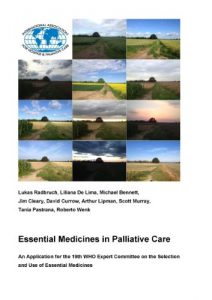This eBook provides a comprehensive review of the evidence available for 14 essential medicines needed for the treatment of 11 of the most most common and burdensome symptoms in palliative care. We hope that palliative care professionals all over the world can use this compilation to advocate for essential medicines in their own service, regional or national setting. It can also be used as a teaching tool on how to put together an evidence-based application that is tailored to the specific needs of the reader.
For many indications high-level evidence from controlled trials is lacking, and so the monographs can also be used to identify areas where additional research is needed, lining out a research agenda for clinical trials in palliative care.
The content of this eBook was compiled for an application to the 19th WHO Expert Committee on the selection and use of essential medicines on Essential Medicines (EML). This application was presented to the Expert Committee in April 2013 in Geneva. The list presented in this eBook is identical with the IAHPC application to the Committee on Essential Medicines, but we have to advise that it does not correspond to the Essential Medicines List, which will be amended following the decision of the committee later in this year.
How can this be used by health care workers and providers? The EML is not constructed as a mandatory list, but rather as a guide to provide governments with a tool they can use when procuring medicines which are needed to meet their national priorities. Similarly, this eBook is not a mandatory list, but it can be used to support and encourage palliative care professionals to urge their governments to ensure access to medicines for palliative care.
We hope that the material we present here will help palliative care patients everywhere in the world to get access to medicines that will relieve their suffering.
The medicines included in this review are:
AMITRIPTYLINE for depression
DEXAMETHASONE for anorexia and for fatigue
DIAZEPAM for anxiety
DOCUSATE SODIUM for constipation
HALOPERIDOL for delirium
HYOSCINEBUTYLBROMIDE for respiratory tract ecretions
IBUPROFEN for pain
LOPERAMIDE for diarrhoea
MIDAZOLAM for anxiety
METOCLOPRAMIDE for nausea and vomiting
MORPHINE for pain and dyspnea
SENNA for constipation
For many indications high-level evidence from controlled trials is lacking, and so the monographs can also be used to identify areas where additional research is needed, lining out a research agenda for clinical trials in palliative care.
The content of this eBook was compiled for an application to the 19th WHO Expert Committee on the selection and use of essential medicines on Essential Medicines (EML). This application was presented to the Expert Committee in April 2013 in Geneva. The list presented in this eBook is identical with the IAHPC application to the Committee on Essential Medicines, but we have to advise that it does not correspond to the Essential Medicines List, which will be amended following the decision of the committee later in this year.
How can this be used by health care workers and providers? The EML is not constructed as a mandatory list, but rather as a guide to provide governments with a tool they can use when procuring medicines which are needed to meet their national priorities. Similarly, this eBook is not a mandatory list, but it can be used to support and encourage palliative care professionals to urge their governments to ensure access to medicines for palliative care.
We hope that the material we present here will help palliative care patients everywhere in the world to get access to medicines that will relieve their suffering.
The medicines included in this review are:
AMITRIPTYLINE for depression
DEXAMETHASONE for anorexia and for fatigue
DIAZEPAM for anxiety
DOCUSATE SODIUM for constipation
HALOPERIDOL for delirium
HYOSCINEBUTYLBROMIDE for respiratory tract ecretions
IBUPROFEN for pain
LOPERAMIDE for diarrhoea
MIDAZOLAM for anxiety
METOCLOPRAMIDE for nausea and vomiting
MORPHINE for pain and dyspnea
SENNA for constipation












